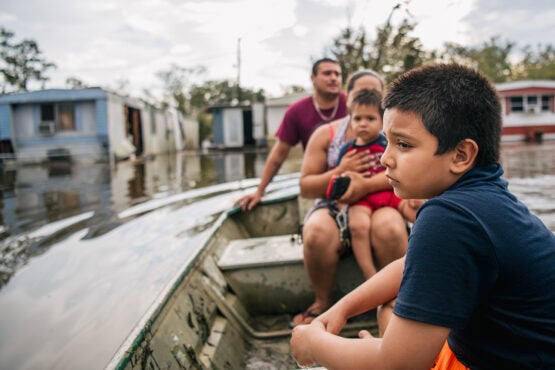March 1, 2022
It’s personal: Stanford-led research reveals how people’s experience with climate-related disasters affects their willingness to take and accept protective actions
Surveys of people exposed to wildfires and hurricanes show that negative experiences with these events are associated with elevated perceived risk for specific climate hazards and self-reported adaptation behaviors, as well as increased support for interventions. The findings could help shape public communications and policy.
Two new studies – a survey of residents in hurricane-battered Florida and Texas and a survey of people in wildfire-scarred California – reveal that negative personal experiences are among key variables in pushing people to take or accept protective measures like flood insurance and planned power shut offs. The wildfire survey, published in Energy Research & Social Science, is among the first analyses of people’s views of climate adaptation policies enacted by companies rather than governments. The hurricane survey, published in Environmental Research Letters, includes populations, such as elderly and poor people, that are often overlooked in such research. Both papers’ findings could inform public communications and policy to help vulnerable communities protect themselves from these and other extreme events.

Family members travel by boat to their home in Barataria, Louisiana, after it flooded during Hurricane Ida in 2021. (Image credit: Getty Images)
“As catastrophic wildfires, hurricanes and other events increase in frequency, they are having severe emotional, social and economic consequences on people’s lives,” said Gabrielle Wong-Parodi, an assistant professor of Earth system science at Stanford’s School of Earth, Energy & Environmental Sciences (Stanford Earth), lead author of the hurricane study and sole author of the wildfire study. “It is imperative that we design ways to mitigate those impacts with an eye toward empowering vulnerable communities.”
Wildfire survey
The 2018 Camp Fire, California’s most destructive and deadly wildfire in recorded history, was sparked by power lines belonging to Pacific Power & Gas (PG&E). Every fire season since, PG&E and Southern California Edison, the dominant utilities in northern and southern California, have instituted temporary public safety power shutoffs to ensure their wires don’t contribute to conflagrations during times of particularly high wind and heat. These shutoffs affect millions.
While they may reduce the risk of wildfires, public safety power shutoffs may also impact health and normal daily activities by making it impossible to use certain home medical equipment, store food safely, attend school or perform work. In a previous pilot study, Wong-Parodi, found that such shutoffs – and, in some cases, even just the threat of shutoffs – were associated with poorer physical and mental health, especially among those living in households with medical concerns, children under 5, adults over the age of 65 and people with extremely low-income.
Wong-Parodi’s newly published wildfire survey shows that people with more personal experiences in terms of health and exposure to hazards, such as poor air quality, were more likely to worry about such risks. In turn, they were more likely to support power shut offs. However, people worried about possible negative impacts from shutoffs were less likely to support them.
These findings make clear that communications about power shut offs that are sent to households in areas affected by wildfires should consider their vulnerabilities and risks, according to Wong-Parodi. She suggests that public utilities work with local municipalities, community organizations and health departments to ensure timely and appropriate communication that provides behaviorally realistic information and resources to support at-home preparation and possible service substitutes, such as backup generators. Such outreach may benefit from making explicit the potential adverse social impacts of wildfire, such as those related to health and property loss.
Hurricane survey
In their newly published hurricane study, Wong-Parodi and co-author Dana Rose Garfin of the University of California, Irvine, surveyed residents of Florida and Texas in 2020 as four potentially major hurricanes brewed in the Atlantic. They found that negative experiences of hurricanes, hurricane risk appraisal and hurricane adaptation appraisal were all positively associated with adaptation behaviors, such as using hurricane forecasts when making travel plans, identifying shelters and putting together emergency kits. Those with more personal experience who also attributed events to climate change had higher risk perceptions that in turn were associated with adaptive behaviors.
The findings suggest that behavioral models of climate change behaviors should include negative personal experiences and beliefs regarding the causes of those experiences to better understand processes of individual decision making and inform interventions to promote adaptation, according to Wong-Parodi and Garfin.
“It is critical to leverage negative climate-related experiences to elicit positive behavior change and adaption, while simultaneously acknowledging and addressing the potential negative mental health implications of exposure to such traumatic events,” said Garfin.
Taken together, the hurricanes and wildfires surveys make clear that effective adaptation requires a better understanding of how people appraise risks and worry about threat of extreme events given their personal experience, their concerns about possible interventions and, ultimately, the origins of support for interventions.
Read more about Stanford wildfire research here.
Wong-Parodi is also a fellow at the Stanford Woods Institute for the Environment. Garfin is an assistant adjunct professor in the Sue & Bill Gross School of Nursing and the Program in Public Health at the University of California, Irvine.
The hurricanes study was funded by the National Science Foundation and the National Center for Atmospheric Research. The wildfires study was funded by the Precourt Institute for Energy at Stanford.
To read all stories about Stanford science, subscribe to the biweekly Stanford Science Digest.
-30-
|